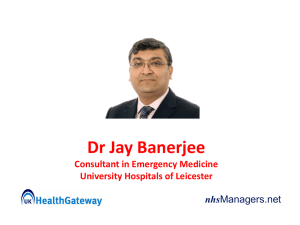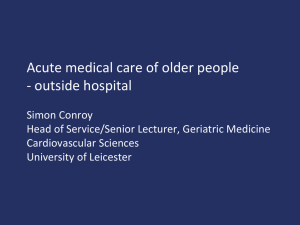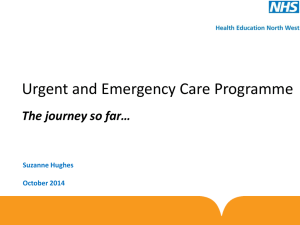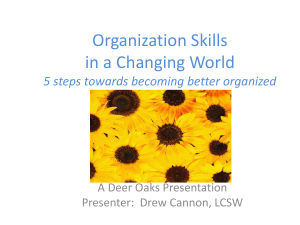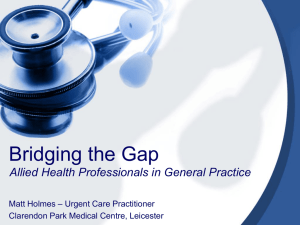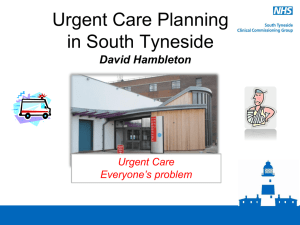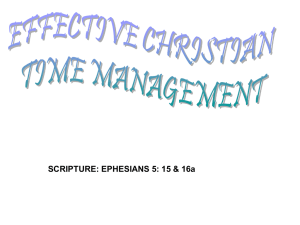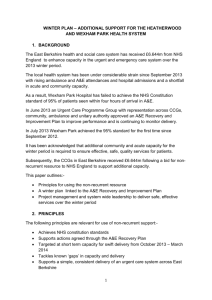International Conference of Emergency Medicine (Banerjee)
advertisement
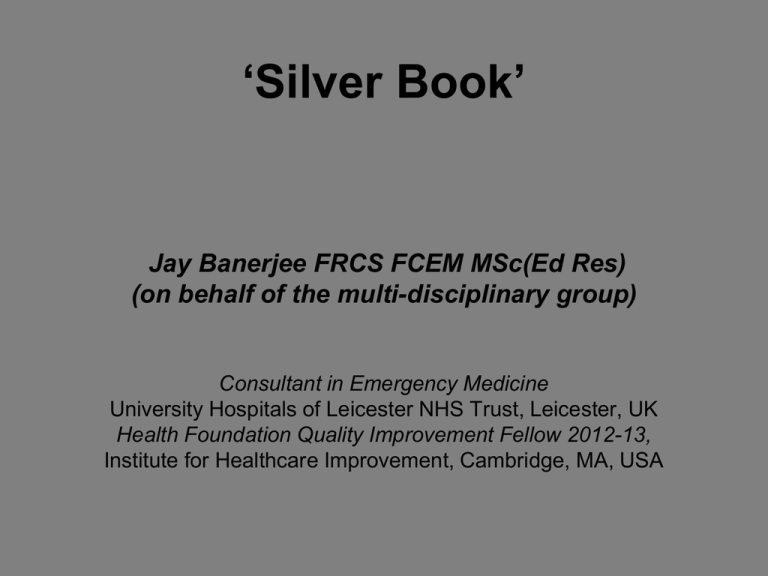
‘Silver Book’ Jay Banerjee FRCS FCEM MSc(Ed Res) (on behalf of the multi-disciplinary group) Consultant in Emergency Medicine University Hospitals of Leicester NHS Trust, Leicester, UK Health Foundation Quality Improvement Fellow 2012-13, Institute for Healthcare Improvement, Cambridge, MA, USA THE FUTURE IS PREDICTABLY GREY….. World • Older people will outnumber children by 2018 • By 2038, over-65s > 1.3 billion (506 million in 2008) – a leap from 7% of the world's population to 14% • Europe is the greyest continent, with 23 of the world's 25 oldest countries UK • • • • Patients over 70 years of age account for more than 15% of attendances (Hospital Episode Statistics) Represent 40% of the 5 million people admitted to hospital in 2008/9 – and increasing Next 20 years, people >85 yrs set to increase by two-thirds, compared with a 10% growth in the overall population Most patients are admitted to hospital via the Emergency Department which is one of the key points in the health and social care system. ED ATTENDANCES THEY ARE COMING..….SILVER TSUNAMI? EMERGENCY DATA BY AGE GROUP NATIONAL REPORTS ON OLDER PEOPLES CARE IN THE NHS • THE HEALTH SERVICE OMBUDSMAN, UK CARE & COMPASSION? Feb 2011 • CARE QUALITY COMMISSION, UK. DIGNITY AND NUTRITION FOR OLDER PEOPLE. Mar 2011 • PATIENT ASSOCIATION, UK. LISTEN TO PATIENTS. SPEAK UP FOR CHANGE. Oct 2011 SOME FINDINGS…. • NHS must close the gap between the promise of care and compassion outlined in its Constitution and the injustice that many older people experience (Ombudsman) • 35% of inspected hospitals needed to improve, 25% did not meet 1 or 2 standards (100 inspected, CQC) • patients’ privacy not being respected – for example, curtains and screens not being closed properly (CQC) • staff speaking to patients in a dismissive or disrespectful way (CQC) • how often should a patient be told that “because of being unable to use the toilet… she should wet the bed”? Is that OK as long as it is only 10 times a month or 20? (Patient Association, UK) CAN THE FUTURE BE A BRIGHTER SHADE – “SILVER” ? • Prof Matthew Cooke NCD Urgent & Emergency Care • Prof David Oliver, NCD Older People • Prof Alistair Burns, NCD Dementia QUALITY CARE FOR OLDER PEOPLE WITH URGENT & EMERGENCY CARE NEEDS: SILVER BOOK An intercollegiate body of work describing care standards for older people over the first 24 hours of an urgent care episode, with the specific remit to: • help decrease variations in practice • influence the development of appropriate services across the urgent care system • identify and disseminate best practice • influence policy development SILVER BOOK MEMBERSHIP • • • • • • • • • • • • • Age UK Association of Directors of Adult Social Services British Geriatrics Society Chartered Society of Physiotherapy Community Hospitals Association College of Emergency Medicine College of Occupational Therapists National Ambulance Service Medical Directors Royal College of General Practitioners Royal College of Nursing Royal College of Physicians Royal College of Psychiatrists Society for Acute Medicine - Focus on Long Term Conditions (heart failure/frailty/dementia/ COPD) - More effective responses to urgent care needs - Advance care planning/end of Life care plans - Targeted input into Care Homes -Access to integrated services through NHS Pathways (3DN) including health & social care Clear operational performance framework integrated with GP processes Ready access to specialist advice when needed Improved integration with 1° & 2° responders via NHS Pathways Front load senior decision process including primary care, ED Consultants& Geriatricians General Practice & GP OOH Community Support Objective: A left shift of activity across the system as a function of time; yesterday’s urgent cases are today’s acute cases and tomorrow’s chronic cases. 999 ED Optimise emergency care: - Evidence based management - Multidisciplinary input from PT / OT & community matrons - Access to intermediate and social care - Front line geriatrician input - Effective information sharing with primary care/ secondary care/ community - Develop minimum data set AMU Inpatient wards - Redesign to decrease LOS with social & multidisciplinary input using a “pull” system - Effective Date of Discharge - Ambulatory care (macro level) for falls/LTC PURPOSE OF SILVER BOOK • Describes the issues relating to older people accessing urgent care in the first 24 hours irrespective of provider • Describes the competencies required to respond • Recommends urgent care standards for older people first 24 hrs of an acute care episode • Contextualises health & social care for older people & at the interface • Aimed to improve satisfaction and outcomes for older people in urgent care & satisfaction amongst staff SILVER BOOK: IS AND ISN’T • This document is a best practice guideline, comprising recommendations based on a review of the literature and refers to evidence where available • It does not describe the commissioning and mode of delivery of the competencies, as these will vary according to local needs, resources and policies. • The older person’s care needs may be delivered in the emergency room, the acute medical unit or a community setting depending on local service configuration. UNDERPINNING PRINCIPLES • Respect for the autonomy and dignity of the older person must underpin our approach and practice at all times. • All older people have a right to a health and social care assessment and should have access to treatments and care based on need, without an age-defined restriction to services • A whole systems approach with integrated health and social care services strategically aligned within a joint regulatory and governance framework, delivered by interdisciplinary working with a patient centred approach provides the only means to achieve the best outcomes for frail older people with medical crises STANDARDS: All older people accessing urgent care should be routinely assessed for (based on priorities) pain delirium, dementia depression nutrition/hydration skin sensory loss falls & mobility activities of daily living continence vital signs safeguarding end of life care issues STANDARDS • • • • There must be an initial primary care response to an urgent request for help from an older person within 30 minutes The presence of one or more frailty syndrome should trigger a more detailed comprehensive geriatric assessment, to start within 2 hours (14 hours overnight) either in the community, patient’s own home or as an in-patient, according to the patient’s needs Health and social services should be commissioned such that they can contribute to early assessment of older people, including mental health assessments. Older people who present with intentional selfharm should be considered as for failed suicide RECOMMENDATIONS • Generic – across all settings in first 24 hrs; including discharge planning • Specific – include - Primary care - Community hospitals - ED/UC/AMU - Mental health - Safeguarding - Major incident planning - Commissioning - Training and development for all staff groups EMERGENCY DEPARTMENT • The assessment area for older people should be located in a quieter, preferably separate, area of the department where observation is possible but noise, interruptions and over stimulation is minimised. However, it should not be close to an exit. • Food and drink should be readily available; helping with nutrition should be provided when necessary • Clinical equipment should be kept to an absolute minimum and where possible create an ambience consistent with the age of the patient • For selected older people, comprehensive geriatric assessment should commence within 2 hours (14 hours overnight) of access to a hospital SUMMARY • The ED represents a key point in the health and social care system where older people with health & social crises can be managed • Create a “frailty friendly front door” • Focus on the needs of the patient, respond to the needs • Think outside the box – challenges are new, traditional way of thinking would not solve it • Commissioning the right model relevant to the needs of the local population • jb234@le.ac.uk
